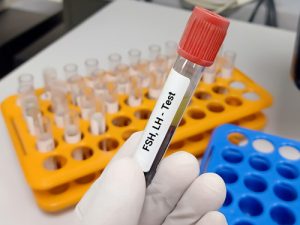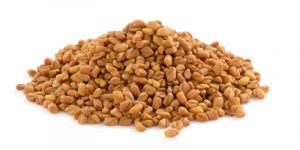When it comes to conceiving, there’s a number of factors that can come into play for fertility struggles and delays in conception. For women, the first step for identifying potential fertility concerns can be found when examining menstrual cycle patterns and cycle tracking results.
When fertility concerns arise, and/or irregular cycles are present, an OB-GYN, GYN, or fertility specialist may begin the fertility treatment process with a number of blood samples to analyze your follicle stimulating hormone (FSH) levels. This hormone, helps regulate female reproduction cycles and is directly involved with the release of eggs from the ovaries during ovulation. An interesting note about FSH is that in men, this same hormone helps regulate male fertility by increasing sperm production.
In addition to checking for healthy FSH levels, you may also be checked to ensure the presence of adequate luteinizing hormone (LH) levels. This hormone, like FSH, plays a vital role in women’s fertility and improves ovarian health in women, progesterone release after ovulation, and testicular health in males. Low levels of LH can be due to a number of factors such as primary ovarian failure, a pituitary disorder, anorexia, malnutrition, or can simply be caused due to increased stress. Physicians use LH tests to narrow down an estimated window for when an egg is released, to increase chances of ovulation.
While the female body has a number of additional hormones that play a vital role in fertility and conception, these two key fertility hormones are essential for proper ovulation, thus making their levels an important focus to ascertain any abnormalities or hormone fluctuations that may need correcting.
Common Symptoms and Causes of Low or High FSH and LH Levels

FSH Levels:
For adult women who are in child bearing years, normal FSH levels range from 4.7 to 21.5 International units per liter (IU/L) and become much higher after menopause, ranging from 25.8 to 134.8 IU/L.
Symptoms:
- Hot flashes
- Irregular or no periods
- Lack of ovulation
- Additional hormone imbalances
- Inability to produce milk for breast-feeding
- Fatigue
- Low sex drive
Causes:
- PCOS
- Ovarian failure
- Low/under weight
- Pituitary disorders
Symptoms:
- Menopause-like symptoms
- Irregular or no periods
- Hot flashes
- Headaches
- Fatigue
- Weight fluctuations
Causes:
- Malfunction in the ovaries
- Turner syndrome
- Early onset menopause
- Pituitary disorders
- Ovarian hyperstimulation syndrome
LH Levels:
Normal levels of LH in adult women, before menopause, range from 5 to 25 IU/L. These levels peak even higher during the middle of the menstrual cycle, and become even higher after menopause, ranging from 14.2 to 52.3 IU/L.
Symptoms:
- Lack of ovulation
- Irregular or no periods
- Nutrient deficiencies
Causes:
- Pituitary disorders
- Malnutrition
- Primary ovarian failure
- Stress
Symptoms:
- Irregular or no periods
- Hot Flashes
Causes:
- Pituitary disorders
- PCOS
- Early onset menopause
- Secondary ovarian failure
- Genetic conditions (i.e. Klinefelter’s syndrome and Turner syndrome)
Whether high or low FSH and LH levels, these lab results can be an indication that your pituitary glands are malfunctioning in some way, leading to fewer or excessive reproductive hormone production that ultimately affect healthy ovulation. Once you begin experiencing any of these symptoms and especially if fertility struggles are present, it’s important that you speak to a doctor, especially if you’re nearing the age of a high-risk pregnancy and want to conceive.
If in fact you do have problems producing these hormones, or maintaining proper hormone levels, your physician may suggest natural or medically-assisted ways to increase your chances of ovulation. For those looking for holistic approaches to balance these hormones without the use of medical therapies, there are some simple lifestyle changes you can use to promote regular ovulation, boost your chances of getting pregnant and balancing your LH and FSH levels naturally.
Natural Ways to Balance LH and FSH Levels
Studies have 
The hypothalamus is nourished by essential fatty acids (EFA’s) and other nutrients. Omega-3 fatty acids are important in supporting the hypothalamus and pituitary glands and in the production of hormones in the body, which may in turn improve your FSH and LH levels. Choosing omega-rich food options to incorporate into your diet include oily fish (salmon, trout and sardines), walnuts, flax seeds, seaweed, and kidney beans. Additionally, including a high-quality omega-3 supplement can also have added benefits, but it can be best to speak with your doctor prior to adjusting your supplementation routine, or before making any drastic lifestyle changes.
There’s no doubt, when we are under mental pressure, this increased stress can elevate the body’s levels of cortisol, one of the main stress hormones, which can then increase blood sugar and insulin levels. Whether it’s stress reduction techniques or regularly fertility massages, for some women, reducing stress hormones can help balance fertility health.
Click here for Stress Reduction Techniques to Help with Conception
Being overweight, or being severely underweight, can contribute to altered LH/FSH ratios to such a degree that fertility is negatively impacted. However, before stocking up on the hottest weight loss diet products or signing up for 30-day challenges, look at making healthy dietary changes that can be sustained long-term, which will ultimately lead to longer lasting overall results.
We all know that regular exercise can have a variety of benefits on various aspects of our cardiovascular health and physical well-being, but it can also aid in regulating insulin sensitivity, improving the frequency of ovulation and supporting healthy body composition, all of which can impact the LH/FSH ratio and overall fertility health.
Click here for our 30-Day Guide to Better Fitness for Fertility Health
In addition to eating healthy and reducing stress, you also need to make sure you’re getting enough rest. Lack of sleep interrupts the restoration process within your body, which also harms your ovulation cycle.
If you are TTC and having issues with FSH and LH regulation, look to cut out cigarettes and alcohol and limit your caffeine intake, as these habits can deplete your body’s nutrients and have a direct correlation to your fertility by causing your estrogen, FSH and LH levels to be unbalanced.
If you are still struggling to maintain a healthy diet, you should speak to a physician about taking dietary supplements that are chronobiologically-formulated, which can help you achieve proper nutrient level necessities throughout the day when dietary choices are leaving you short.
In some cases, abnormal levels of FSH or LH can be balanced with daily nutritional supplements, such as myo-inositol, which is associated with improved egg quality and potentially making the ovaries more responsive to FSH and LH.
Some research has found that ginseng may help nourish the pituitary gland and the hypothalamus, both of which contribute to FSH and LH levels.
This fertility-boosting herb helps inhibit FSH by increasing the secretion of the LH hormone, which in turn increases progesterone.
The key to knowing which approach to take when it comes to naturally raising or lowering your hormone levels is knowing where your levels are, and where they need to be. To do this, it is essential you seek medical help to properly determine whether your FSH and LH levels are higher or lower than normal for your circumstance and to determine if there are underlying conditions such as PCOS and pituitary disorders that may be affecting your levels as well. By knowing this information, you can make the proper decisions for your situation that will be in line with your health and hormone balancing goals.
When you want to get pregnant, and FSH and LH fluctuations are causing fertility struggles, it is important to do everything within your power to balance your body’s hormones to conceive. Using these natural lifestyle changes can greatly increase chances of ovulation, especially when paired with medical intervention.




